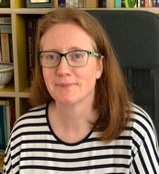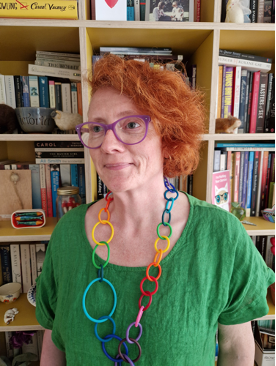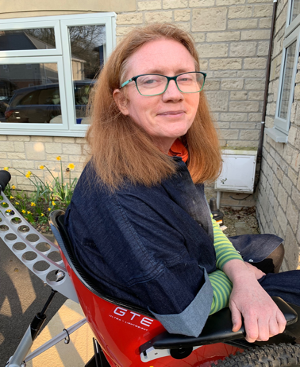Profile

Victoria Clarke
Birth:
1973
Training Location(s):
PGCert, University of the West of England (2004)
PhD, Loughborough University (2002)
BSc, Brunel University London (1997)
Primary Affiliation(s):
University of the West of England (2003 – Present)
University of Exeter (2002-2003)
Psychology’s Feminist Voices Oral History Interview:
Other Media:
UWE Bristol: Dr Victoria Clarke
Victoria Clarke, Nikki Hayfield and Naomi Moller - Story Completion
Career Focus:
Thematic analysis, critical psychology, gender and sexuality, appearance and embodiment, family and relationships
Biography
Born in Hillingdon, Victoria Clarke was raised in a churchgoing family, but quickly began to question the values that characterised her immediate world. From a young age, church life didn’t feel right, and she soon declared to her parents and local minister “I don’t believe in God and I don’t want to go to church anymore”. This seemingly innate drive to question norms remained with Clarke throughout her unconventional journey into academia.
Guided by parents with little personal knowledge of or experience with higher education, Clarke attended a comprehensive school on the fringes of London. The area was plagued by racism, so Clarke soon began to get involved in antifascist activism, encouraged by a teacher. Clarke’s investment in psychology wasn’t crystallised until her difficult teenage years. A period of deep depression left her unwilling to return to the oppressive school environment, so she opted instead to join a sixth-form college. Here, Clarke was exposed to academics who had “been rejected from other parts of the world” and who had much freedom over the curriculum. Against the backdrop of Section 28, a bill that prohibited the “promotion” of homosexuality through teaching and publishing, lecturers showed radical feminist documentaries and, in an act of deeply touching trust, subtly disclosed their queerness by sharing a book with an author dedication reading ‘in lesbian sisterhood’.
By 1993, the staunchly feminist Clarke had enrolled at Brunel University to undertake an undergraduate degree in Psychology. Critical and feminist psychologists populated the interdisciplinary teaching team and captured Clarke’s imagination. Today, she credits this atmosphere for giving her direction within academia, stating “I fear if I’d gone somewhere more mainstream, I wouldn’t have fallen in love with psychology”. During this time, Clarke also attended her first Psychology of Women and Equalities Section conference, an experience she describes as “exciting”, “inspiring”, and “supportive”. By her third year, Clarke was simultaneously appreciating her own sexuality and realising that she wanted to take feminist studies even further; two streams of thought that culminated in a decision to abandon her aim of clinical training in favour of doing a PhD.
When the name ‘Celia Kitzinger’ kept coming up in her reading, Clarke decided to write to the eminent feminist psychologist and author of ‘The Social Construction of Lesbianism’, thus initiating an influential working relationship. Alongside Kitzinger, Clarke secured funding to undertake her PhD research around lesbian and gay parenting at Loughborough University. There was a dearth of critical research on this topic, so Clarke widened the lens: she delved into the social construction of lesbian and gay parenting in the media, in psychology, and within relationships themselves, drawing diverse ideas from feminist, constructionist, and discursive research. During these PhD years, after some sessions of ‘sentence therapy’ with her friend Virginia Braun to tackle mild dyslexia, Clarke published widely, producing award-winning work including ‘The psychology and politics of lesbian and gay parenting: Having our cake and eating it?’ (2001). Since then, Clarke has won several more awards, including the 2013 and 2022 British Psychological Society (BPS) Book Award, the American Psychological Association’s Best Book in Lesbian, Gay, and/or Bisexual Psychology for 2007, the Association of Women in Psychology Distinguished Publication Award for 2014, and the 2022 BPS President’ Award.
Despite positive reception within the world of feminist critical psychology, Clarke soon noticed her work was considered ‘fringe’ and realised that “doing critical psychology on lesbians wasn’t a great career move”. After a challenging job search, Clarke was offered a research fellowship at Exeter University, and in 2002 began investigating a new topic: first-time heterosexual marriage and money management. After a year, Clarke moved to the University of the West of England (UWE), where she continues to work today as an Associate Professor in Qualitative and Critical Psychology. Here, when Virginia Braun came to UWE for a sabbatical, together they produced the most-cited work of 2006: ‘Using thematic analysis in psychology’. The paper has since accrued over 175,000 citations, transforming Clarke into a leader in qualitative methods, something that she says happened ‘completely by accident’. Nonetheless, Clarke gained a huge platform within mainstream psychology, producing popular publications including ‘Successful Qualitative Research: A Practical Guide for Beginners’ (2013) and ‘Thematic Analysis’ (2014), though she continues to covertly disseminate critical thought by using feminist examples in her methodological writing.
Today, Clarke loves supervising student projects, particularly when there is an opportunity for her to learn more. She is particularly passionate about using Story Completion, a once-controversial method Celia Kitzinger re-theorised as something that takes researchers out into the world and helps them understand how people make sense of things. Clarke has disseminated this method among supervisees, colleagues, and via the UWE curriculum, but also uses it on ‘passion projects’ with Virginia Braun around gender, sexuality, relationships, and disability. This professional work gained new meaning in 2019 when Clarke was diagnosed with Multiple Sclerosis (MS), creating a personal drive to better understand disability and improve accessibility within psychology. Throughout this shift, Clarke has continued to feel embraced in feminist spaces like the BPS POWES conference: “it was still that really friendly welcoming space”.
Outside of academia, Clarke describes her world as a “gentle space”, where she enjoys engaging in needle felting. But her personal life is still powerfully feminist; Clarke engages in craftivism, producing needle-felted designer vaginas, running workshops at POWES, and using craft to help students connect with one another at UWE. As a self-described introvert, Clarke says craftivism feels like a joyful, non-confrontational way to engage with activism whilst also connecting with others and creating “small bubbles of joy”.
By Siobhan Collman (2023)
To cite this article, see Credits
Selected Works
Braun, V., Clarke, V., & Terry, G. (2014). Thematic analysis. In A. Lyons, & P. Rohleder (Eds.), Qualitative research in clinical and health psychology. Palgrave MacMillan
Clarke, V., & Braun, V. (2013). Successful qualitative research: A practical guide for beginners. Sage.
Clarke, V., Ellis, S., Peel, E., & Riggs, D. (2010). Lesbian, gay, bisexual, trans and queer psychology: An introduction. Cambridge University Press.
Clarke, V., & Peel, E. (Eds.). (2007). Out in psychology: Lesbian, gay, bisexual, trans and queer perspectives. John Wiley & Sons Ltd.
Braun, V., & Clarke, V. (2006). Using thematic analysis in psychology. Qualitative Research in Psychology, 3(2), 77-101.
Clarke, V. (2001). The psychology and politics of lesbian and gay parenting: Having our cake and eating it? Lesbian & Gay Psychology Review, 2(2), 36-42.
Photo Gallery



Victoria Clarke
Birth:
1973
Training Location(s):
PGCert, University of the West of England (2004)
PhD, Loughborough University (2002)
BSc, Brunel University London (1997)
Primary Affiliation(s):
University of the West of England (2003 – Present)
University of Exeter (2002-2003)
Psychology’s Feminist Voices Oral History Interview:
Other Media:
UWE Bristol: Dr Victoria Clarke
Victoria Clarke, Nikki Hayfield and Naomi Moller - Story Completion
Career Focus:
Thematic analysis, critical psychology, gender and sexuality, appearance and embodiment, family and relationships
Biography
Born in Hillingdon, Victoria Clarke was raised in a churchgoing family, but quickly began to question the values that characterised her immediate world. From a young age, church life didn’t feel right, and she soon declared to her parents and local minister “I don’t believe in God and I don’t want to go to church anymore”. This seemingly innate drive to question norms remained with Clarke throughout her unconventional journey into academia.
Guided by parents with little personal knowledge of or experience with higher education, Clarke attended a comprehensive school on the fringes of London. The area was plagued by racism, so Clarke soon began to get involved in antifascist activism, encouraged by a teacher. Clarke’s investment in psychology wasn’t crystallised until her difficult teenage years. A period of deep depression left her unwilling to return to the oppressive school environment, so she opted instead to join a sixth-form college. Here, Clarke was exposed to academics who had “been rejected from other parts of the world” and who had much freedom over the curriculum. Against the backdrop of Section 28, a bill that prohibited the “promotion” of homosexuality through teaching and publishing, lecturers showed radical feminist documentaries and, in an act of deeply touching trust, subtly disclosed their queerness by sharing a book with an author dedication reading ‘in lesbian sisterhood’.
By 1993, the staunchly feminist Clarke had enrolled at Brunel University to undertake an undergraduate degree in Psychology. Critical and feminist psychologists populated the interdisciplinary teaching team and captured Clarke’s imagination. Today, she credits this atmosphere for giving her direction within academia, stating “I fear if I’d gone somewhere more mainstream, I wouldn’t have fallen in love with psychology”. During this time, Clarke also attended her first Psychology of Women and Equalities Section conference, an experience she describes as “exciting”, “inspiring”, and “supportive”. By her third year, Clarke was simultaneously appreciating her own sexuality and realising that she wanted to take feminist studies even further; two streams of thought that culminated in a decision to abandon her aim of clinical training in favour of doing a PhD.
When the name ‘Celia Kitzinger’ kept coming up in her reading, Clarke decided to write to the eminent feminist psychologist and author of ‘The Social Construction of Lesbianism’, thus initiating an influential working relationship. Alongside Kitzinger, Clarke secured funding to undertake her PhD research around lesbian and gay parenting at Loughborough University. There was a dearth of critical research on this topic, so Clarke widened the lens: she delved into the social construction of lesbian and gay parenting in the media, in psychology, and within relationships themselves, drawing diverse ideas from feminist, constructionist, and discursive research. During these PhD years, after some sessions of ‘sentence therapy’ with her friend Virginia Braun to tackle mild dyslexia, Clarke published widely, producing award-winning work including ‘The psychology and politics of lesbian and gay parenting: Having our cake and eating it?’ (2001). Since then, Clarke has won several more awards, including the 2013 and 2022 British Psychological Society (BPS) Book Award, the American Psychological Association’s Best Book in Lesbian, Gay, and/or Bisexual Psychology for 2007, the Association of Women in Psychology Distinguished Publication Award for 2014, and the 2022 BPS President’ Award.
Despite positive reception within the world of feminist critical psychology, Clarke soon noticed her work was considered ‘fringe’ and realised that “doing critical psychology on lesbians wasn’t a great career move”. After a challenging job search, Clarke was offered a research fellowship at Exeter University, and in 2002 began investigating a new topic: first-time heterosexual marriage and money management. After a year, Clarke moved to the University of the West of England (UWE), where she continues to work today as an Associate Professor in Qualitative and Critical Psychology. Here, when Virginia Braun came to UWE for a sabbatical, together they produced the most-cited work of 2006: ‘Using thematic analysis in psychology’. The paper has since accrued over 175,000 citations, transforming Clarke into a leader in qualitative methods, something that she says happened ‘completely by accident’. Nonetheless, Clarke gained a huge platform within mainstream psychology, producing popular publications including ‘Successful Qualitative Research: A Practical Guide for Beginners’ (2013) and ‘Thematic Analysis’ (2014), though she continues to covertly disseminate critical thought by using feminist examples in her methodological writing.
Today, Clarke loves supervising student projects, particularly when there is an opportunity for her to learn more. She is particularly passionate about using Story Completion, a once-controversial method Celia Kitzinger re-theorised as something that takes researchers out into the world and helps them understand how people make sense of things. Clarke has disseminated this method among supervisees, colleagues, and via the UWE curriculum, but also uses it on ‘passion projects’ with Virginia Braun around gender, sexuality, relationships, and disability. This professional work gained new meaning in 2019 when Clarke was diagnosed with Multiple Sclerosis (MS), creating a personal drive to better understand disability and improve accessibility within psychology. Throughout this shift, Clarke has continued to feel embraced in feminist spaces like the BPS POWES conference: “it was still that really friendly welcoming space”.
Outside of academia, Clarke describes her world as a “gentle space”, where she enjoys engaging in needle felting. But her personal life is still powerfully feminist; Clarke engages in craftivism, producing needle-felted designer vaginas, running workshops at POWES, and using craft to help students connect with one another at UWE. As a self-described introvert, Clarke says craftivism feels like a joyful, non-confrontational way to engage with activism whilst also connecting with others and creating “small bubbles of joy”.
By Siobhan Collman (2023)
To cite this article, see Credits
Selected Works
Braun, V., Clarke, V., & Terry, G. (2014). Thematic analysis. In A. Lyons, & P. Rohleder (Eds.), Qualitative research in clinical and health psychology. Palgrave MacMillan
Clarke, V., & Braun, V. (2013). Successful qualitative research: A practical guide for beginners. Sage.
Clarke, V., Ellis, S., Peel, E., & Riggs, D. (2010). Lesbian, gay, bisexual, trans and queer psychology: An introduction. Cambridge University Press.
Clarke, V., & Peel, E. (Eds.). (2007). Out in psychology: Lesbian, gay, bisexual, trans and queer perspectives. John Wiley & Sons Ltd.
Braun, V., & Clarke, V. (2006). Using thematic analysis in psychology. Qualitative Research in Psychology, 3(2), 77-101.
Clarke, V. (2001). The psychology and politics of lesbian and gay parenting: Having our cake and eating it? Lesbian & Gay Psychology Review, 2(2), 36-42.


